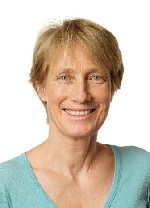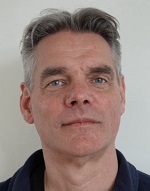Passing the baton of radiation biology committee chair: PDF Version
Interview with the former chair Rob Coppes by the present chair Heidi Lyng
For this edition of the newsletter, Heidi Lyng, the new chair of the radiation biology (RB) committee, met former chair Rob Coppes at the 2022 conference of the European SocieTy for Radiotherapy and Oncology (ESTRO) to hear his thoughts as he looked back at his six years as committee chair.
Heidi Lyng:
First, I and the committee thank you for all your work and effort as committee chair. You have now left the committee after two periods as chair, and your engagement will indeed be missed. It is good to see you, relaxed and obviously enjoying the conference.
Rob Coppes:
Thank you very much, I enjoyed the time as chair very much. I learned a lot and it is of course with some sad feelings that I leave the committee. Having said that, to be a part of this conference without the attentiveness and responsibility that you always have as committee chair, is great. It is a feeling that I haven't had since I started my work as committee chair in 2015.
How did your career as committee chair start?
It actually started at my first committee meeting; I had just become a member. The chair at that time, Brad Wouters, was about to leave and the committee was looking for a replacement. I was asked to take over and agreed. As soon as the board had approved my candidature, I became the new chair.
Why did you want to become the RB committee chair?
I had been a member of the scientific advisory group (SAG) of ESTRO over many years. This cultivated my interest in ESTRO, and I wanted to learn more about the organisation and how it worked. I saw the importance of promoting the biology field in ESTRO, and had a strong ambition to achieve that. I think it is important for ESTRO to have biology included as a focus of interest, not only for the scientific part but also for educational purposes.
Which achievements by the committee are you most proud of?
A major task has been to create the RB college website. This involved a lot of work. It had been discussed in the committee already, before my time, that we needed a place where all biologists in ESTRO could have an overview of the scientific expertise in Europe and how to get in contact with these milieus. With the RB College, we made a networking site and a database that involved all major radiobiology centres in Europe. We hoped that this could help to foster collaboration within the European radiobiology environment and provide connections between students and institutes for training opportunities.
Now, social media has emerged as a more efficient way to distribute information, also in the scientific community. Hopefully, we will soon have a social media platform that can function in the same way as we intended with the RB College. Still, I think all the work we had with the college was valuable and taught us how to proceed to the next step.
We also had a lot of discussions in the committee about how to make the ESTRO conference more attractive for biologists. We made two changes to the programme. First, we compressed the RB track into three days and included a stronger RB focus within the interdisciplinary track. Due to the pandemic, which came almost at the same time, it is too early to evaluate the effect of this initiative. Another point was to invite biologists outside the radiation field as conference speakers in the RB track and to aim for the best one, regardless of country. The work to attract biologists to ESTRO is a permanent challenge that has to be followed up by the committee.
An exciting initiative that was taken in my last year as chair was to join the physics workshop with a joint RB/physics topic. The workshop is supported by ESTRO and organised annually by the physics committee for some time. The first joint workshop will be held later this year and will promote collaboration and the exchange of knowledge across the two disciplines.
What did you enjoy most?
I really loved working with all my enthusiastic colleagues on the committee. These researchers are among the leading experts in the radiobiology field in Europe, and it was truly a privilege to lead a committee of such skilled and dedicated people. We had a lot of fun together! I also liked very much the overall task to promote biology in ESTRO.
What do you see as the most important tasks for the committee in the future?
It is very important to make sure that we have an influx of young people in our research field into ESTRO. For example, it’s crucial to have biologists on the young ESTRO committee.
We should also encourage our PhD students to attend ESTRO conferences and courses and help them to build a network within the radiobiology community. It is also important that biology education is updated continuously with new, exciting topics in the field, both through teaching lectures at conferences and in biology courses.
A third point I want to emphasise is the need for small scientific radiobiology meetings outside ESTRO. The Wolfsberg meeting is a good example that has proven to be important for European radiobiology research and clinician scientists with an interest in radiobiology, as it fosters collaboration and recruitment to the field.
Having recruited me as your successor, what is your advice to me as the new committee chair?
The success of the committee work is not only dependent on you as chair, but also on the people you select to be part of the committee. When looking for new people, you should make sure that they are dedicated and have shown engagement; for example, as SAG members or in our activities. This is very important, since we are a small community in ESTRO with a relatively high workload. I also recommend that you embrace the great opportunity to learn how ESTRO works, for example by participating in a task force and open board meetings. I think the coming years will be an exciting and important time for the RB committee in ESTRO, and I wish you all the best for the work.

Professor Heidi Lyng
Department of Radiation Biology
Oslo University Hospital
Norway
Email: heidi.lyng@rr-research.no

Professor Rob P. Coppes
Departments of Radiation Oncology &
Biomedical Sciences of Cells and Systems
University Medical Center Groningen
University of Groningen
The Netherlands
Email: r.p.coppes@umcg.nl